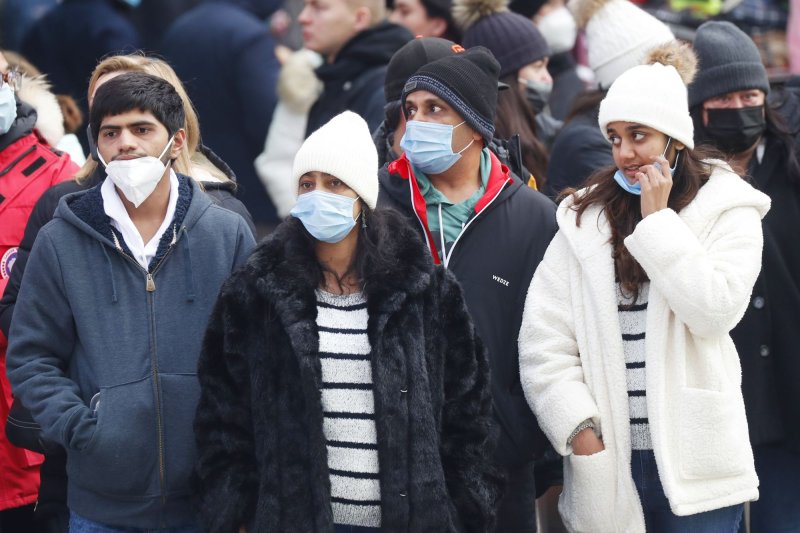1 of 5 | Multiple bouts with COVID-19 and regular booster vaccinations are likely to become part of normal modern life as the coronavirus becomes endemic, experts say. File Photo by John Angelillo/UPI |
License Photo
COVID-19 might be easing into a new status as a widely circulating and somewhat harsher version of the common cold, experts say -- a virus that folks could contract repeatedly, even if they were recently infected.
"[COVID-19] is destined to join four of its family members and become an endemic coronavirus that will repeatedly infect individuals throughout their lifetimes," said Dr. Amesh Adalja, of Johns Hopkins Center for Health Security, referring to the four circulating coronaviruses that cause the common cold.
"It will become one of several respiratory viruses that people contend with, and will become increasingly less disruptive and more manageable with medical countermeasures and the population's risk acclimatization," he added.
With the advent of the Omicron strain, the virus has become much more adept at reinfecting even those who have some immune protection against COVID-19.
Studies have estimated that the rate of Omicron infections is six to eight times higher than Delta infections in the United States. But the true rate is unknown, because many infections are unreported as people test at home.
COVID-19 vaccines and previous infections might protect against severe disease, but neither has been able to prevent some folks from catching the virus again and again.
"It may well be that this virus now has mutated so that it's highly contagious but produces, by and large, mild illness," said Dr. William Schaffner, medical director of the National Foundation for Infectious Diseases.
"This is a family of viruses that does not produce sustained immune protection, so it's likely that we can, as we already are seeing, get reinfected periodically," Schaffner said.
And unlike influenza, but like the common cold, COVID-19 has the potential to become a year-round irritant.
While COVID-19 waves are more intense in winter months, as people go indoors and infection risk rises, the coronavirus also is capable of producing outbreaks in the summer, Schaffner said.
"Influenza essentially disappears from April through about September or October, and then we have very dramatic seasonal outbreaks," he said. "COVID's not like that. We've had summer outbreaks. We've had winter outbreaks. It can produce disease at any time of the year."
A small fraction of people who contract COVID-19 will run the risk of long-term symptoms, due to the virus' ability to cause severe immune overreactions in some that lead to nerve and organ damage, the experts said.
"We're getting a better handle on it, but that doesn't mean we can't learn a lot more" about long-haul COVID-19, said Dr. Aaron Glatt, chief of infectious diseases at Mount Sinai South Nassau in Oceanside, N.Y.
"That is one of the concerns about this illness that may not be as much of a concern with flu or other circulating viruses, that they don't seem to have the long-term side effects as COVID," Glatt said.
Glatt and Schaffner said there is one way to prevent long-haul symptoms -- stay up to date on your COVID-19 vaccinations.
"I think there are now some data to suggest that being vaccinated does prevent some of those long-term complications," Glatt said.
There's room for improvement on that front, as COVID-19 settles in to stay, Schaffner added.
"Approximately half of the people who are eligible for the third dose - I'm not talking about the fourth, just the third, you know, the first booster - have not yet received it," he said. "And it's that third dose, the first booster, that really provides more secure protection against serious disease. And the vaccines are free and they're widely available. So you can see we still have to get an awful lot of folks, as we say, singing from the same page."
Even healthy people can run afoul of COVID's long-term symptoms, but vulnerable individuals will need to be even more careful going forward, the doctors said.
People with different risks will have potentially different levels of concern about continuously circulating virus.
"Are you older? Are you frail? Do you have noteworthy underlying illnesses -- heart disease, lung disease, diabetes? Are you obese? Are you immune compromised?" Schaffner said. "Those people certainly would be well-advised to be more cautious."
That means continuing to wear masks at public gatherings indoors and getting tested right away if you have symptoms, he said.
That's important, Schaffner said, "because we now have an antiviral that we can give you that will help prevent your evolution into more serious disease."
Also, he added, be ready to get COVID-19 booster shots, as doctors continue their cat-and-mouse game of countering the coronavirus' continuing attempts to evade people's immune protection.
"This fall I would anticipate -- this is looking into my crystal ball a bit -- that we will have an updated COVID vaccine, COVID vaccine 2.0, as it were," Schaffner said. "There may well be the recommendation that we all go out this fall and get two vaccines, one in each arm" for COVID-19 and influenza.
"That's not going to be an easy sell," he added.
More information
The U.S. Centers for Disease Control and Prevention has more about COVID-19.
Copyright © 2022 HealthDay. All rights reserved.
![]()
















